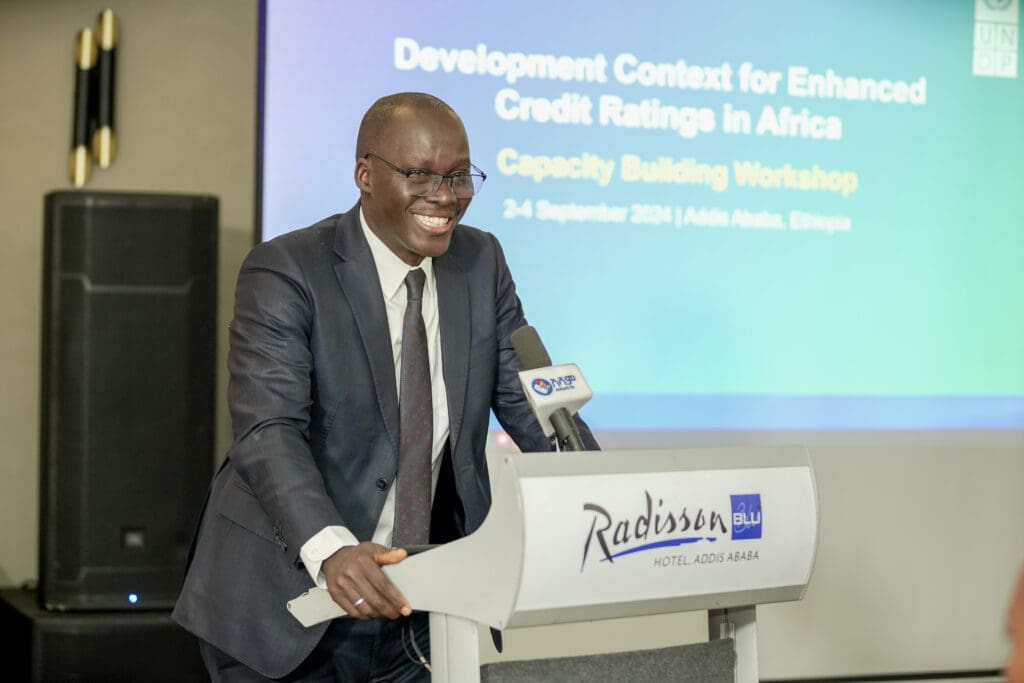Blog
UNDP Africa and AfriCatalyst host regional workshop on enhancing credit ratings for development in Africa
Addis Ababa, 3 August 2024 — With Africa requiring an additional $1.3 trillion per year to make meaningful progress toward the Sustainable Development Goals, the need for innovative financing strategies and improved access to international capital markets to finance development is more critical than ever.
Recent downgrades of African countries by the Big Three credit rating agencies – Moody’s, S&P and Fitch Ratings – have highlighted the urgent need for many African countries to address their fiscal challenges and secure development financing.
In response, almost 50 stakeholders and key government officials from Ethiopia, Tanzania, Kenya, Uganda and the United Nations Economic Commission for Africa (UNECA) are convening in Ethiopia’s capital, Addis Ababa, for a three-day regional workshop aimed at equipping participants with the knowledge and tools needed to improve their credit ratings processes.
Organized from 2 to 4 September, the Regional Workshop on the Development Context for Enhanced Credit Ratings in Eastern Africa is a collaborative initiative of AfriCatalyst and UNDP Africa to support African countries in navigating credit ratings. The initiative focuses on capacity building and delivering practical knowledge and training through a resource platform, advisory services and a platform for
connecting and engaging with policymakers in the credit ratings space.
Speaking during the opening session, Samuel Doe, Resident Representative of UNDP Ethiopia, underscored the importance of understanding credit ratings processes and their implications on development financing to achieve sustainable development goals. “Credit ratings matter because they can enhance a country’s reputation and market standing. A lower credit rating means a higher cost of capital, which means more money for debt servicing and less on priority areas. Many African nations face tough choices between managing debt and investing in their future.”
In his contribution, Daouda Sembene, Chief Executive Officer of think tank AfriCatalyst, emphasized the need for engagement between government officials and credit rating agencies in navigating credit ratings to achieve sustainable development. “We hope this workshop marks the start of meaningful and productive collaborations, knowledge sharing and peer learning between government officials in the region. Together, we must enhance support for African countries to access adequate and affordable financing so that they can accelerate progress towards the Sustainable Development Goals, particularly in key sectors such as health, education, climate resilience and infrastructure.”

Commending the initiative, Shigeki Komatsubura, Resident Representative of UNDP Tanzania, urged African countries to leverage the opportunity to understand credit rating processes. “Let us take full advantage of this opportunity to begin restoring our collective credit strengths to where we started in the early 2000s with the help of UNDP’s ground-breaking Africa credit rating initiative,” he remarked.
Zuzana Brixiova Schwidrowski, Director of Macroeconomics, Finance, and Governance at the United Nations Economic Commission for Africa (UNECA), highlighted the critical importance of this initiative, stating that “with only 2 African nations currently holding investment-grade ratings, it’s clear that the sovereign debt burden is a critical challenge. UNECA, in collaboration with UNDP, is committed to helping African countries seize this momentum, build strong institutions, and usher in a new cycle of positive credit ratings and sustainable development”.
Raymond Gilpin, Chief Economist at the UNDP Regional Bureau for Africa, led the day’s first session on Africa’s development context and credit ratings. “We need to view credit ratings as a development financing issue. By working with professionals, we can improve data and knowledge of the right policy and institutional frameworks and learn how best to negotiate with credit rating agencies”.
The workshop will conclude with a high-level policy dialogue on 4 September at UNDP Regional Service Centre for Africa in Addis Ababa. Titled A Continent in Conversation: Alternative Strategies to Improving Africa’s Credit Ratings, the event will bring together key policymakers, government officials and experts from across Africa for an open conversation on the strategic and policy implications of sovereign credit ratings and their impact on Africa’s development financing landscape.
Since its establishment, the UNDP-AfriCatalyst credit ratings initiative has been strengthening the capacity of government officials in African countries, beginning with a capacity building workshop held in Tanzania in July 2024. The main components of the initiative include the Africa Credit Ratings Resource Platform, a central hub for resources and tools on credit ratings; a Concilium of senior advisors to provide high-level guidance and support to countries seeking to improve their credit ratings; and a community of practice for knowledge sharing collaboration between government officials and other stakeholders.
RSVP to attend the policy dialogue: http://bit.ly/ContinentInConversation
For more information:
Laetitia Ouoba, Communications Specialist, UNDP Regional Service Centre for Africa; laetitia.ouoba@undp.org
Fifi Esther Ahonhede, Communications and Projects Officer, AfriCatalyst; fahonhede@africatalyst.com
About UNDP
UNDP is the leading United Nations organization fighting to end the injustice of poverty, inequality, and climate change. Working with our broad network of experts and partners in 170 countries, we help nations to build integrated, lasting solutions for people and the planet. Learn more at undp.org or follow @UNDP and @UNDPAfrica.
About AfriCatalyst
AfriCatalyst is an independent, global development advisory firm that strives to build partnerships between global and local actors to promote innovative, evidence-based solutions to Africa’s development challenges.
